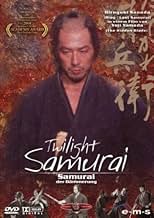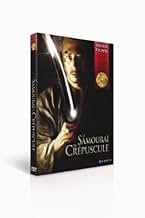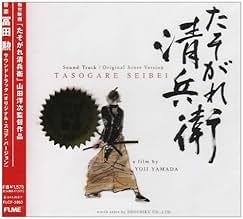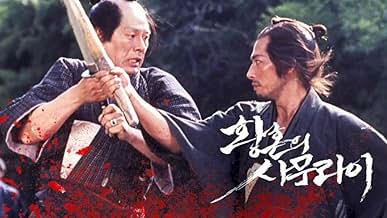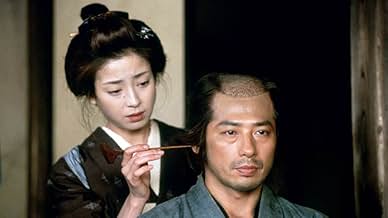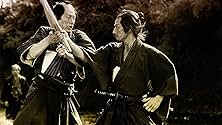As the feudal Japan era draws to a close, a widower samurai experiences difficulty balancing clan loyalties, 2 young daughters, an aged mother, and the sudden reappearance of his childhood s... Read allAs the feudal Japan era draws to a close, a widower samurai experiences difficulty balancing clan loyalties, 2 young daughters, an aged mother, and the sudden reappearance of his childhood sweetheart.As the feudal Japan era draws to a close, a widower samurai experiences difficulty balancing clan loyalties, 2 young daughters, an aged mother, and the sudden reappearance of his childhood sweetheart.
- Director
- Writers
- Stars
- Nominated for 1 Oscar
- 38 wins & 9 nominations total
- Director
- Writers
- All cast & crew
- Production, box office & more at IMDbPro
Featured reviews
I don't have a top ten list of all time favorite films but if I did Twilight Samurai would be on it. Nominated for best foreign film the same year that the Hollywood film the last samurai got a few nominations it is impossible not to compare the two. While I enjoyed the Last Samurai and it's message of questioning western cultural imperialism Twilight Samurai is a film on whole different level.
LS is a bloated Hollywood epic that delivers intense battles with huge numbers and a unrealistic unsatisfying bullshit love story. Do we really believe that the woman who lost her husband to Tom Cruise the smelly drunk white would fall in love with him?
Twilight Samurai is the opposite in everyway and in everyway it is a better film that is bound to move to tears the hardest of yall out there. It is the story of a petty samurai who after the long lingering death of his wife finds himself become a devoted father.
When Twilight comes and the other samurai go out to drink, he rushes home to clean the house, tend the field and care for his daughters. He has lost track of his imagine, he smells and all he cares about is what is best for his daughters.
When his childhood crush returns and revolution looms this petty samurai is forced into confronting his status as a samurai. Unlike last samurai the small battle between two samurai's at the end is more emotionally involved that any CGI enhanced battle could ever be. The romance in the film is so sweet, tender and believable that is makes the film special.
This could not be as special as it is without excellent acting, direction and above all writing. Holy crap see this movie.
Sanada plays Seibei Iguchi, a poor, 50-koku ranked samurai who has to support his two daughters and a senile mother, due to the passing away of his wife. The structure and plot turns of the story are simple, but fascinating to watch unfold, and it is perhaps the simplicity and novelistic grace of the narrative that makes the film so remarkable. Seibei works as a scribe with his fellow samurai, and always has to rush home after work to attend to his duties as a father. He lets hygieine slowly slide into second priority (resulting in rather unkempt clothes and socks), but in general, he doesn't seem to care: his two daughters he treasures above all other things. When a woman named Tomoe, a childhood friend that Seibei was particularly fond of, suddenly re-appers into his life, Seibei makes certain decisions that he ultimately ends up regretting later. The rest of the story is full of very interesting plot develoments, playing with the audience's expectations (especially with the relationship between Tomoe and Seiebi), and although the film is not a traditional samurai film in that it does not have alot of action scenes, the composition of the tale, and its "storytelling" invocation (one of the daughters narrates) is good enough to keep you watching.
Hiroyuki Sanada playing Seibei is really a marvel to watch; he adds a very sensible depth and modesty to the character, and infuses it with some understated comic acting as well. At the end of the film, after the climatic final battle, Sanada is able to make the character of Seibei resonate with a very unconventional but nonetheless strong and beautiful heroism. Sanada is really a very talented thespian, and in this film, you may get to sample the sheer range of his great technique. For the world-class acting work he did in this film, he won a Japanese Academy Award, and the film also got noticed by the Oscars (nominated for Best Foreign Language Film, 2004). If there's a chance your able to catch this film in a local theatre (usually, it plays at Landmark) do so, you won't regret it. You'll be able to watch an excellent story unfold, and also see some of the finest acting in world cinema today.
'Twilight Samurai' is a very sweet film. Sorry, those words, sweet and samurai, may not be used together too much but believe it! With luck, 'The Last Samurai' was just that for Hollywood but please Jollywood bring on more of these.
'Tasogare Seibei' is a story about a low-level Samurai family headed by a widower raising two daughters and his mother who's lapsing into senility. What little action in this film shows how far Seibei (Hiroyuki Sanada) has drifted from his professional prowess. He earns his keep as a scribe and an insect trap maker. When he is called on to defend the honor of his clan, his skill is resurrected although his heart is not in it.
Beautifully filmed and dramatically staged, 'Twilight Samurai' will amuse, dazzle and delight you. Told from the perspective of his daughter reflecting on her life with father, this sentimental tale has the feel of allegory and even novices to this genre will enjoy it. My only criticism is the abrupt ending without a clear resolution. And my lack of Japanese language skills distracted me from this well-acted, set and costumed film.
Just another reason to learn the language.
As in much of the cross-fertilization of samurai movies and Westerns such that one can easily imagine a Westernized version, the opening situation recalls "Unforgiven," where a retired gunfighter just wants to be left alone to farm and raise his children and tries to resist pressures to stop putting his fighting skills under a literal grubby basket.
Hiroyuki Sanada gives a superbly nuanced performance as a rebel against the expectations of being the lowest of a high class in a rigidly caste society by embracing the sarcastic titular sobriquet. He is painfully reluctant that he is ever so circuitously revealed to be much more. World weary yet still proud, he gropes for words to explain to his shocked patriarch why he, as an indebted widower, prefers to come home straight from work to see his daughters grow up day by day than follow the family's dictates and anguishes to his best friend about his marriage prospects.
Gradually, surprising people around him are revealed to be as equally complex and frustrated with the roles their society insistently demands even as small step by suffocating step political and social webs inexorably ensnare them tighter and tighter. The flashes of their assertions of their individuality in unexpected moments make for quiet, gripping moments of tension and relief. As his returning childhood friend, Rie Miyazawa has a beautiful, spirited feminity that makes Sanada seem even more of a macho hunk in contrast.
A kind of Jane Austen action flick, it is the kind of movie where antagonists' stares make you hold your breath in suspense and the touch of a hand brings forth your tears.
The translator made a policy decision of just transliterating many traditional Japanese terms, from "sensei" to various styles of sword-fighting, etc. rather than try to find English equivalents. While their meaning can be pretty much inferred from context, it did help that post "Kill Bill" I've been making up for a benighted education that lacked samurai movies and Japanese history.
I found the voice-over narration by the younger daughter a bit schmaltzy and unnecessary. The closing song seemed jarringly period-inappropriate; if it wasn't a Japanese cover of Bob Dylan's "To Make You Feel My Love" then it was a real close imitation with the only clue in English that it was used with permission of EMI.
This is the first of novel adapter/director Yoji Yamada's 77 films that I've seen and I certainly now want to see more.
Did you know
- TriviaOfficial submission of Japan for the 'Best Foreign Language Film' category of the 76th Academy Awards in 2004.
- GoofsWhile Seibei fighting with Toyotaro, Toyotaro katana fell on the ground, right beside Seibei. Toyotaro fell towards river and Seibei make step forward towards Toyotaro, so the katana clearly should stay behind Seibei, beyond possibility to reach by Toyotaro. But from different camera can be seen that katana lay between both of them, 2 meters ahead of Seibei. It's most likely intentional arrangement by director, otherwise Toyotaro wouldn't be able to made his last attempt to grab katana.
- Quotes
Seibei Iguchi: I am ashamed to say that over many years of hardship with two daughters, a sick wife and an aged mother, I have lost the desire to wield a sword. A serious fight, the killing of a man, requires animal ferocity and calm disregard for one's own life. I have neither of those within me now. Perhaps in a month... alone with the beasts in the hills I could get them back. But tomorrow, I am afraid, is completely impossible.
- ConnectionsFeatured in The 76th Annual Academy Awards (2004)
- SoundtracksKimerareta Rhythm
Performed by Yosui Inoue
- How long is The Twilight Samurai?Powered by Alexa
Details
- Release date
- Country of origin
- Official sites
- Language
- Also known as
- The Twilight Samurai
- Filming locations
- Production companies
- See more company credits at IMDbPro
Box office
- Budget
- $5,000,000 (estimated)
- Gross US & Canada
- $559,765
- Opening weekend US & Canada
- $8,573
- Apr 25, 2004
- Gross worldwide
- $7,372,769
- Runtime2 hours 9 minutes
- Color
- Sound mix
- Aspect ratio
- 1.85 : 1
Contribute to this page



